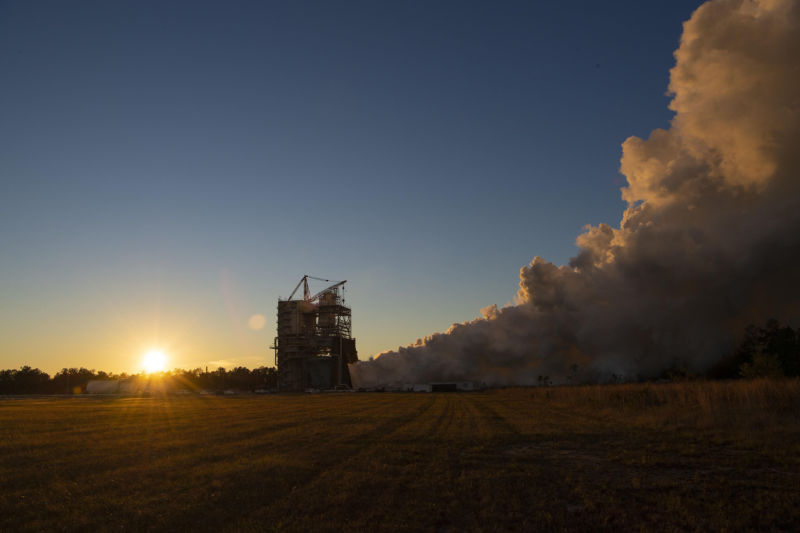
For much of March and April, in response to a desire from the Trump administration to accelerate development of the Space Launch System rocket, NASA has been looking at ways to launch the large booster in 2020 instead of further delaying it. Among the options has been skipping a "green run" test of the rocket's core stage—an all-up firing of the rocket's four main engines for the full duration of an ascent to orbit.
NASA has been preparing for this test for the better part of a decade, and according to the agency it has spent about $230 million to renovate and modify the B-2 test stand at Stennis Space Center in Mississippi for this purpose. These modifications included special equipment required for the SLS rocket's green run test and future testing of the Exploration Upper Stage.
During this test the rocket is clamped down, and its firing marks an important step to validating that the rocket will perform as anticipated during an actual launch. However, transporting the core stage to the test stand, installing it, testing it, firing it, and then moving it again would take an estimated six to nine months. By skipping the test, NASA could have shaved that much time from the development of a rocket that is already more than two years late, possibly allowing the agency to keep the rocket to its latest launch date of mid-2020.
"Urgency is our mantra"
In a memo shared with senior agency managers earlier this week, NASA's chief of human spaceflight, William Gerstenmaier, said the green run test would proceed. He also acknowledged that the first test flight of the rocket, Exploration Mission-1 (EM-1), would likely be delayed beyond 2020.
"Ultimately, it was my recommendation to the agency that we stay the course with the plan that we have had for many years," Gerstenmaier wrote in the memo, dated April 22, which Ars obtained. "Although there is no certainty in when we launch, I believe this is the best approach to achieving a successful EM-1 flight test and put NASA on the path to achieving an EM-2 crewed mission in 2022 and a Lunar Surface mission in 2024."
Among those who received a copy of the memo was Jody Singer, the director of Marshall Space Flight Center, which manages the SLS rocket's development. In announcing his decision, Gerstenmaier also expressed the need for urgency.
"We must, however, have a higher degree of urgency in accomplishing EM-1 and beyond," Gerstenmaier wrote. "I ask the entire NASA/Industry community to diligently work toward the earliest EM-1 launch possible, to identify ways that we can be more efficient, and to continue to pay attention to detail to enable NASA [to have] a successful EM-1." He closed his letter by saying, "Urgency is our mantra and we must do it right."
The agency has not commented publicly on the memo. On Thursday, a spokeswoman told Ars of the green run decision, "We’re still assessing and no final decisions have been made."
In recent weeks, the future of the SLS rocket has been a hot topic at the agency as the Trump administration seeks to accelerate a return of humans to the Moon by 2024, and NASA Administrator Jim Bridenstine has said the SLS must play a key role. Further launch delays would put the 2024 date in jeopardy, at least if the lunar mission relies on SLS performance.
A matter of safety
The issue of the green run test also arose Thursday at a meeting of NASA's Aerospace Safety Advisory Panel, during which members recommended that NASA carry out the test to ensure the rocket's safety. NASA's present plan is to launch just a single test flight of the SLS rocket before putting crew on the EM-2 mission, which is scheduled to fly a crew into lunar orbit.
“There is no other test approach that will gather the critical full-scale integrated propulsion system operational data required to ensure safe operations,” the panel's chairwoman, Patricia Sanders, said about the green run test. “Shorter-duration engine firings at the launch pad will not achieve an understanding of the operational margins, and could result in severe consequences.”
Bagikan Berita Ini














0 Response to "NASA to perform key test of the SLS rocket, necessitating a delay in its launch - Ars Technica"
Post a Comment